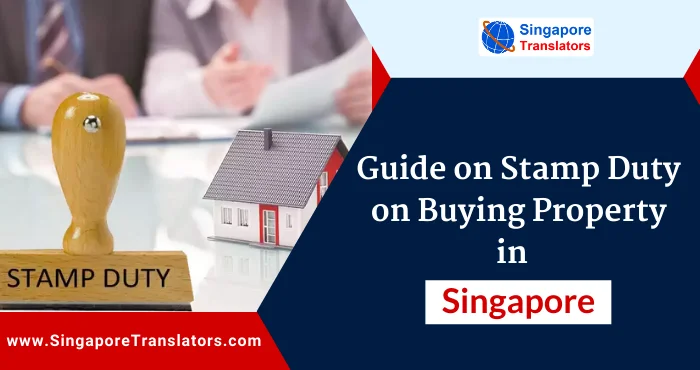No doubt, investing in properties in Singapore is one of the major investments. Still, when buying properties in Singapore, you must pay the Stamp duty basically on the dutiable document, which mainly relates to the immovable property in Singapore. There are many stamp duty that applies to property buying or property transfer or several property-related things. In the below-shared article, we have covered several stamp duty types that apply to the property and several dutiable and non-dutiable documents. Continue reading the article to learn more about the stamp duty on buying the property.

Table of Contents hide
Buyer’s Stamp Duty
The buyer’s stamp duty is levied on all the property you purchase in Singapore. The amount of the buyer’s stamp duty is payable based on the following points:
- The price of the property as mentioned in the signed sale and purchase agreement
- The buyer’s stamp duty needs to be paid on the property’s market value as acquired from the valuation reports of the property.
How to calculate Buyer’s Stamp Duty?
The current BSD rates are:
| The purchase price or market value of property | BSD rate |
| First $180,000 | 1% |
| Next $180,000 | 2% |
| Next $640,000 | 3% |
| Next $640,000 | 4% |
For example, suppose the cost of your property is $600,000, in such a situation Buyers Stamp Duty will be charged are as follows:
1% x $180,000) + (2% x $180,000) + (3% x (600,000 – 180,000 – 180,000)) = $12,600.
Suppose the cost of your property is less than $1 million; in such a case, you use the below-given formula to calculate the BSD:
3% x purchase price or market value
Get Fast & Accurate official notarization for ICA, MOM, MFA.
Additional Buyer’s Stamp Duty
On the basis of your residency status in the country and the number of residential property you already holds in Singapore, you might be required to pay additional buyers stamp duty during the time of purchasing residential property in Singapore.
What is considered residential property?
The most common residential properties like condominiums, terrace houses, bungalows, HUDC apartments, cluster houses, and HDB flats.
HDB flats with shophouses and living quarters with some of its additional portions basically granted for the residential use are also considered a residential property for additional buyer’s stamp duty purposes.
How to calculate Additional Buyer’s Stamp Duty
The process of calculating the additional buyers stamp duty is similar to the buyer stamp duty, which is paid according to the property’s price or market value, whichever is higher.
The additional buyer’s stamp duty rates are applicable based on the residential status of the buyer, i.e. whether you are Singapore permanent resident, foreigner or Singapore citizen.
Here is the list of ABSD rates from 6th July 2018:
You will fall under the category of purchasing additional residential property if you already have a Residential property in Singapore (irrespective of you jointly, fully or wholly own first property).
Additional Buyer’s Stamp Duty always be paid when you buy additional residential properties in Singapore?
There are several situations when you are not required to pay the additional buyers’ stamp duty when buying additional residential properties in Singapore. Some of them are as follows:
- At the time when you have already entered into a contract to sell your present residential property prior to signing another contract to purchase the new property in Singapore.
- If you are separated from the house prior to purchasing the additional property in Singapore.
- If you are falling downwards from selling a private property to the HDB resale flat. This is because you need to sell your private property within the duration of six months before purchasing HDB resale.
- If you and your spouse are planning the moving house, which means looking to sell your present property to live in another one. Always remember in such a case, you are required first to pay the additional buyer stamp duty, and then you can apply for the refund within the duration of six months of reselling the first property. You can get more information related to it on the Inland Revenue Authority of the Singapore (IRAS) website.
What if you are buying the property jointly with someone else?
If you are planning to buy the residential property along with someone else like your spouse, then you will require to check if different additional buyers stamp duty rates applies to both of you.,
If it applies, then a higher ABSD rate will be applied to calculate additional buyer’s stamp duty.
For example, suppose you are planning to purchase a new condominium along with your spouse. But, you and your spouse both already own the following properties and are Singapore citizens:
| Buyer’s residency status | ABSD rate on the purchase of first property | ABSD rate on the purchase of second property | ABSD rate on the purchase of third and subsequent property |
| Singapore citizens, and nationals and Permanent Residents of Switzerland, United States of America, Liechtenstein, Iceland and Norway | ABSD rates are not applicable on the first property | 12% | 15% |
| Singapore Permanent Residents | 5% | 15% | 15% |
| Foreigners | 20% | 20% | 20% |
| Your properties | Your spouse’s properties |
| A condominium unit (sole owner) | A condominium unit (sole owner) |
| Terrace house (jointly owned with your parents) | – |
Hire a Language translator for converting your legal & Other Documents.
Deadline for paying the Buyer’s Stamp Duty and Additional Buyer’s Stamp Duty
Once the property sale and purchase agreement has been signed in Singapore, you are required to pay the buyers’ stamp duty and additional buyer’s stamp duty within the duration of 14 days after the agreement is signed.
And if the purchase and sale agreement of the property was signed abroad, then you will get 30 days to pay the stamp duty once the agreement is received in Singapore.
Consequences of late payment
If additional buyer’s stamp duty or buyers’ stamp duty is still not paid even after the due date, you will be provided with the demand note to remind you regarding the outstanding amount that needs to be paid. The issued demand note will also include the penalty that you will be entitled to for missing the payment deadline.
The penalty that you are required to pay is:
- If you have delayed the payment for up to 3 months, you will be required to pay the penalty of $10 or the amount equal to the additional buyer stamp duty and buyer stamp duty payable, whichever amount is higher.
- If you have delayed the payment for more than three months: In such a situation, you will be entitled to the penalty of $25 or the amount equal to 4 times the ABSD and BSD that needs to be paid, whichever is more.
- The Inland Revenue Authority of Singapore might also approach your bank, tenant, employer, or lawyer to pay the outstanding amount of the stamp duty on your behalf. However, IRAS can also take legal action against you for recovering the due amount.
1. What is an electronic document?
The electronic document consists of any of the following things that impact the transaction in any of the immovable property, shares or any stocks:
- The electronic record that impacts the transaction
- An electronic record and verbal communication that all together impact the translation provided the electronic record concluded the transaction.
- A physical document and electronic record, when integrated, impact the transaction.
2. When and where is an electronic document treated as executed?
It is very important to understand when and where the electronic document is executed as it might impact the deadline by which you are required to stamp the document. For example, suppose the documents that are executed within Singapore then it has to be stamped within the period of 14 days following the date it has been executed. In comparison, for the documents executed outside Singapore and then brought into Singapore, those documents need to be stamped within the period of 30 days after getting received in Singapore.
Dutiable Documents
Documents on which stamp duty are charged include both in electronic and physical form:
1. Lease / Tenancy Agreements for Properties
These are some of the documents that need to be signed at the time of renting a property. Stamp duty is calculated based on the market rent or actual rent in these properties, whichever is more.
2. Transfer Documents for Properties
There are a total of three kinds of duty usually payable on the purchase, sale, acquisition or disposal of properties in Singapore:
- Buyer’s Stamp Duty (BSD)
- Additional Buyer’s Stamp Duty (ABSD)
- Seller’s Stamp Duty (SSD)
Buyer stamp duty is charged on the purchase of the properties. The property was purchased before 20 Feb 2018, the rate for the buyer stamp duty for both non-residential and residential properties was charged at 3%. After the 20th of Feb 2018, there were changes in the buyer stamp duty rates for both residential and non-residential properties. The buyers stamp duty rates for residential properties on or after 20 Feb 2018 was extended to 4%.
If you purchase residential property along with residential land on or after 8 December 2011, an ABSD will also be applicable for such a property.
If you purchase residential properties and industrial properties on or after 25th 2010 and 12 January 2013, respectively, in such case, Seller’s Stamp Duty (SSD) will be charged if the properties are sold within the holding period.
3. Mortgages for Properties
These are some of the documents that need to be signed at the time of mortgage property to acquire the loan from the bank or private financial institutions. The stamp duty is charged based on the loan amount.
Non-Dutiable documents
There are several non-dutiable documents on which you do not require to pay the stamp duty. Some of the non-dutiable documents are as follows:
- Stamp duties do not apply to the assignment of intangible assets, including trademarks, patents, and goodwill.
- Assignment of intangible assets such as Goodwill, Trademark, and Patents
- Assignment of book debts/receivables (e.g., sale proceeds)
- The assignments of the book receivables or book debts (for example, sale proceeds)
- You are not required to pay the stamp duty on the appointment letters and transferring power of attorney.
- On the promissory note, you do not need to pay the stamp duty.
- In case of date of appointment of trustees: where the vesting of interest does not include.
- The stamp duty does not apply to the fixed and nominal duty documents, excluding the declaration of trust on or after 19th Feb 2011.
- Those settlements are not related to the property and shares.
- Stamp duty is not payable on the loan agreement that is not related to the properties and shares.
- Charter-party
- Hire Purchase Agreement
- Service contracts not in connection with the granting of a lease
- Statutory Declaration, Affidavit
- Will
- Insurance documents
Choose our reputed translation company for quality translation service
After reading the above article on stamp duty, you might be aware of all the details related to stamp duty and its respective rates.
Apart from this, if you seek a reputed company for translation to translate your foreign language documents into English. Then without any confusion, quickly connect with the Singapore translator. At Singapore translator, we have a professional translator team that provides high-quality rapid translation service. Our translated document gets accepted by the concerned Singapore authorities.

